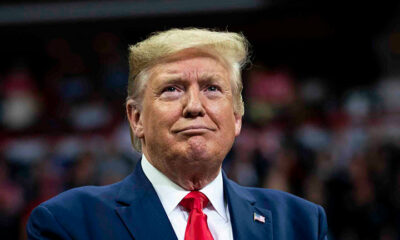Features
Emeka Obia: How a List is Stalling Nigeria’s Greatness
 If you’re a Nigerian, I would be most surprised if you haven’t heard or read about a certain anticipated list. #TheList has trended virtually on every social media platform. Facebook, twitter, Instagram just to mention but three. A list most digital savvy Nigerians monitored right from far away New York City down to the Federal capital territory.
If you’re a Nigerian, I would be most surprised if you haven’t heard or read about a certain anticipated list. #TheList has trended virtually on every social media platform. Facebook, twitter, Instagram just to mention but three. A list most digital savvy Nigerians monitored right from far away New York City down to the Federal capital territory.
Nigeria is 55 years, and Nigerians as usual have showered the nation with wonderful messages on how far the nation has come; others have crafted personalized single-minded narratives on what being a citizen means to them. I casually asked a few friends what they thought improved in the country within the last year. Electricity was the most popular response. Another improvement nod I got was the Agriculture and Entertainment sector (and in the respondent’s words “by entertainment, I mean Nollywood movies, the quality of movies have improved”. My best bet would be that she was referring to the “New Nollywood” steered by the Kunle Afolayans’, Emem Isongs’ and the likes.)
I couldn’t agree less about the improvement in the Agricultural sector. Agriculture as a share of total lending in Nigeria has since grown from nearly zero to 7% in three years. The President of AFDB and former Nigerian agriculture and rural development minister Akinwumi Adesina implemented a new e-voucher program to directly connect farmers with fertilizer producers and distributors – making the process more efficient by removing government as the middleman. . He also partnered with Nigeria’s central bank to create a $350 million risk-sharing fund to encourage more banks to lend to farmers; creating more opportunities within the sector. You would agree with me that he was successful in applying market mechanisms to create widespread opportunity in that sector. It would be an incredible opportunity to further leverage the large and growing Nigeria youth population in growing this sector.
Back to the List. Nigerians have become apprehensive over the delay by President Buhari in appointing a team of ministers to help drive the affairs of the nation. Social media has been flooded with messages by Nigerians earnestly waiting for the ministerial list of candidates who are to form the cabinet of the President. A harmless search of the hashtag #TheList on twitter will provide you with more insights.
With the Nigerian economy said to be deep in the woods, reasons for these anxieties is quite apparent. Naira exchange rate has alarmingly climbed down from less than N1=$1 in 1985 to N200/$ and above today. There is also, growing international pressure, once again, to further devalue the Naira by between 15-20% i.e. to N230-240=$1, with the carrot of more portfolio investment inflow, despite their fickle disposition. Nigerians are well aware that devaluation would destroy the economy – That’s why they are troubled.
Nigerians know that the inflationary spiral which comes with weaker Naira exchange rates will also reduce consumer demand with adverse consequences on industrial capacity utilisation, fresh direct investment and the already oppressive rate of employment – That’s why they are worried.
They also understand that higher raw material costs will be induced by weaker Naira exchange rates and indisputably make “made in Nigeria” goods uncompetitive and therefore promote Nigeria as an inviting dumping ground for myriad imports.
Investors in the financial markets have remained on the sideline as a result of lack of fiscal policy direction from the president coupled with exchange rate uncertainty. Even though the government of President Buhari has sent a strong message that the era of impunity is over, and that “corruption is no longer fashionable”, critics still use the less flattering sobriquet, “Baba Go Slow” to describe Mr President.
Nigerians are even more worried because our ability as a nation to create wealth has increasingly been hampered by the lack of prudence, transparency and honesty in the management of public resources by some of those entrusted with the duty of governance at all levels in the past, so much that in the midst of plenty, Nigerians are still suffering great deprivation.
While some people claimed that the delay in filling the important government positions has not, in any way, affected the smooth running of government agencies, it still appears that activities have been brought to a standstill. Not much has been heard about the 2015 budget. By now, one would have thought the budget implementation should have far gone.
It is evident that Nigeria urgently need ministers who will facilitate development of the policies, leaders who will be more dedicated to the service of the country and not accidental front-runners who are in the office to loot the nation’s wealth.
Senator Ben Bruce’s recent tweet is quite shocking – “The total population of out of school children in Nigeria is more than the combined populations of Switzerland, Monaco & Greenland!”
The dwindling oil revenue has sure dealt an enormous blow to the Nigerian economy and may have limited the capacity of government at various levels to meet even basic commitments. Nigeria needs to find ways to leapfrog its looming growth challenges.
President Buhari has spent more than a 100 days in office and has achieved a number of feats, no doubt. However, he can and will certainly accomplish a lot more with a competent team on ground – and this needs to happen as quickly as possible.
Because our future holds more promise than our past, we are left with the choice to remain hopeful and believe the current administration will deepen efforts to convalesce the Nigerian economy.
Over to you: What would you say has improved within the last year? And what calibre of leaders should make #TheList?
Photo Credit: Dreamstime | Kadettman



















